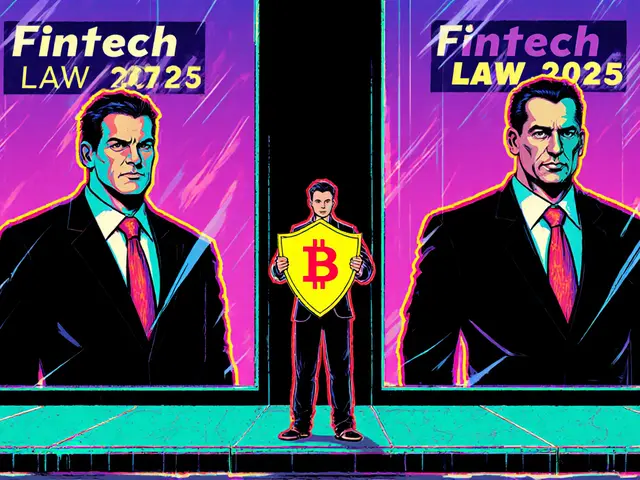Mexico Crypto Compliance Checker
Check Your Crypto Business Compliance
This tool helps you determine if your business activities comply with Mexico's Fintech Law. Based on your responses, we'll provide guidance on whether you're in compliance or at risk of violating regulations.
If you’re using cryptocurrency in Mexico, you might think it’s legal because you can buy Bitcoin on local exchanges. But here’s the catch: the law doesn’t treat crypto like cash. It’s not banned, but it’s not fully accepted either. And if you’re running a business that touches crypto, the rules are strict, complex, and changing fast.
How Mexico’s Fintech Law Works (2025 Version)
Mexico’s Fintech Law, passed in 2018, was the first of its kind in Latin America. It didn’t just slap rules on digital banks - it created a whole new category of financial institutions. Today, companies that offer digital payments, crowdfunding, or crypto-related services must be licensed by the National Banking and Securities Commission (CNBV) Mexico’s primary financial regulator responsible for supervising fintech institutions and enforcing compliance with the Fintech Law and monitored by the Bank of Mexico (Banxico) Mexico’s central bank that regulates electronic payment systems and virtual asset transactions.There are only three types of licensed fintech operators: crowdfunding platforms, electronic payment fund providers, and sandbox-tested innovators. That’s it. If your business does anything else - like offering crypto trading, staking, or lending - you’re either operating in a gray zone or breaking the law.
Every licensed company must have two key roles filled: a Compliance Officer and a Chief Information Security Officer. These aren’t titles you can hand to an intern. They need real expertise, full-time attention, and direct reporting lines to regulators. Many small startups can’t afford this overhead. That’s why most crypto-focused businesses in Mexico are either foreign-backed giants like Nu A Mexican digital banking platform that operates under the Fintech Law and offers digital wallets and payment services or local giants like Mercado Pago A major digital payment platform in Mexico that complies with CNBV regulations for electronic fund transfers.
Cryptocurrency Is Legal - But Only for Individuals
You can buy Bitcoin on Bitso or Binance, hold it in a wallet, send it to a friend, or even use it to pay for services from a private seller. No law says you can’t. But if you’re a bank, payment processor, or fintech startup - you’re under heavy restrictions.Financial institutions are banned from directly holding, trading, or offering crypto as a service. That means no crypto-to-fiat exchanges operated by banks. No crypto savings accounts. No staking rewards through Mexican fintech apps. Even if a company claims it’s “just a wallet,” if it’s converting crypto to pesos, it’s violating the law unless it’s licensed under the Fintech Law - and no license currently covers that activity.
The only legal way for a business to touch crypto is through the Financial Intelligence Unit (FIU) Mexico’s agency responsible for monitoring suspicious financial transactions and enforcing anti-money laundering rules reporting system. If you’re a crypto exchange or a business accepting crypto payments, you must:
- Verify every customer’s identity using official ID (INE, passport, etc.)
- Identify who really owns the business (beneficial owners)
- Monitor all transactions for unusual patterns
- Report any transaction over $5,000 USD equivalent to the FIU
- Keep all records for at least five years
Failure to do this isn’t a fine. It’s a criminal offense. The FIU has cracked down on unlicensed crypto platforms before. In 2023, three unregistered platforms were shut down after laundering over $28 million in crypto through Mexican bank accounts.
Why the Gray Zone Is Getting Riskier
Many people think Mexico’s rules are outdated. And they’re right. The Fintech Law was written before DeFi, before NFTs, before stablecoins became mainstream. Today, people are using USDT to pay for rent, send remittances, or buy groceries - but the law doesn’t recognize any of that.Regulators know this. In 2024, Banxico started testing a digital peso pilot with five banks. That’s a sign they’re moving toward a central bank digital currency (CBDC). But until then, crypto remains outside the formal system. And that creates a dangerous mismatch.
For example: a small business owner in Guadalajara accepts USDC from a customer in the U.S. to pay for handmade jewelry. She converts it to pesos through a peer-to-peer app. No bank involved. No KYC. No reporting. Is that illegal? Technically, yes - because she’s acting as an unlicensed financial intermediary. But no one’s checking. Until they do.
Experts like Romina Benvenuti from Nu Mexico warn that this gap is hurting innovation. “We’re stuck between a law that protects consumers and a market that’s moved on,” she said in a 2025 fintech summit. “If we don’t update the rules, Mexican startups will keep moving to Colombia, Brazil, or even Singapore.”

What’s Coming in 2025: Fintech Law 2.0
There’s growing pressure to rewrite the law. Industry leaders, including Stori A Mexican fintech company offering digital credit and financial services to underserved populations and CONDUCEF Mexico’s consumer protection agency for financial services that enforces transparency rules for fintechs, are pushing for “Fintech Law 2.0.” The goal? Make it flexible enough to include new models without sacrificing security.Proposed changes include:
- Creating a new license category for virtual asset service providers (VASPs)
- Allowing regulated fintechs to offer custody and trading services for crypto
- Harmonizing rules with international AML standards to make cross-border payments easier
- Reducing compliance costs for startups through tiered licensing (basic vs. advanced)
These changes aren’t guaranteed. But the momentum is real. In March 2025, the Mexican Congress began reviewing amendments to the Securities Market Law that could open doors for fintechs to raise capital through tokenized assets. That’s a big deal - it could let startups issue digital shares or bonds under regulatory oversight.
What This Means for You
If you’re an individual using crypto in Mexico: you’re fine. Just don’t pretend it’s legal tender. Don’t expect banks to support it. And don’t assume your crypto transactions are private - the FIU can trace them if they suspect fraud.If you’re a business owner:
- Don’t offer crypto trading or conversion unless you’re licensed - and no license currently allows it.
- If you accept crypto as payment, document everything. Know your customer. Report big transactions.
- Don’t use foreign crypto platforms to bypass Mexican rules. That’s how you get flagged.
- Start preparing for 2025 changes. If Fintech Law 2.0 passes, early adopters will have a head start.
For startups: the cost of compliance is high. Hiring a compliance officer and CISO can cost $80,000+ per year. That’s why most new crypto businesses either partner with licensed fintechs or operate offshore. But that’s not sustainable. The future belongs to those who play by the rules - even if the rules are still being written.

Financial Inclusion Is the Real Goal
Mexico still has 38% of its adult population unbanked. That’s 32 million people. Fintech was supposed to fix that. And it has - in some ways. Digital wallets, mobile payments, and microloans are now common. But crypto hasn’t helped much here.Why? Because crypto isn’t accessible. You need a smartphone, internet, ID, and understanding of blockchain. Most unbanked Mexicans don’t have those. Fintechs that focus on simple, peso-based digital wallets - like Stori A Mexican fintech company offering digital credit and financial services to underserved populations - are the ones actually closing the gap.
The real question isn’t “Can you use crypto?” It’s “Should you?” If your goal is to serve the unbanked, crypto isn’t the answer. But if you’re building a business that wants to scale across borders, understanding Mexico’s fintech rules is your first step.
Final Reality Check
Mexico didn’t ban crypto. It just refused to make it part of the financial system. That’s not a mistake - it’s a strategy. They want to control the risks before the chaos arrives. And in 2025, that’s still the safest bet.But the clock is ticking. Every day without clear rules creates more uncertainty. More risk. More missed opportunities. The next version of the Fintech Law won’t be about stopping innovation. It’ll be about channeling it - safely, legally, and profitably.
If you’re in Mexico and working with crypto, don’t wait for the law to catch up. Get ahead of it. Know the rules. Document everything. And prepare for change - because it’s coming.
Is it legal to buy Bitcoin in Mexico?
Yes, individuals can legally buy, hold, and send Bitcoin and other cryptocurrencies in Mexico. You can use local exchanges like Bitso or international ones like Binance. However, financial institutions - including banks and licensed fintechs - are not allowed to offer crypto trading or custody services as of 2025.
Can Mexican fintech companies offer crypto wallets?
No. Current Fintech Law licenses only cover crowdfunding, electronic payment funds, and sandbox testing. None of these allow crypto custody or conversion. Companies like Nu and Mercado Pago offer digital wallets - but only for pesos and fiat-based transactions. Any wallet that holds or trades crypto operates outside the law unless it’s a foreign platform with no Mexican entity.
What happens if I accept crypto as payment for my business?
You’re not breaking the law by accepting crypto, but you’re now subject to AML rules. You must verify your customer’s identity, monitor transactions, and report any suspicious activity - especially if you convert crypto to pesos. If you don’t, you risk being flagged by Mexico’s Financial Intelligence Unit. Many small businesses ignore this, but enforcement is increasing.
Is there a digital peso in Mexico yet?
Not yet. The Bank of Mexico began testing a central bank digital currency (CBDC) pilot in late 2024 with five banks. It’s still in early stages and not available to the public. If launched, it would be a government-backed digital peso - completely separate from Bitcoin or Ethereum.
Why is Mexico’s crypto regulation considered outdated?
The Fintech Law was written in 2018, before DeFi, NFTs, and stablecoins became mainstream. It doesn’t define or regulate virtual assets as financial instruments. While countries like Brazil and Colombia have moved toward open finance and clearer crypto rules, Mexico’s system still treats crypto as a technical curiosity - not a financial tool. This creates confusion for businesses trying to innovate.
Will Mexico legalize crypto exchanges in 2025?
It’s likely. Multiple industry groups and regulators are pushing for “Fintech Law 2.0,” which would create a new license category for virtual asset service providers. While no law has passed yet, Congress began reviewing amendments in early 2025. If approved, regulated crypto exchanges could launch by late 2025 or early 2026.
Do I need to pay taxes on crypto in Mexico?
Yes. The Mexican Tax Administration Service (SAT) treats cryptocurrency as an asset. If you sell, trade, or convert crypto and make a profit, you owe capital gains tax. You’re required to report these transactions in your annual tax return. Failure to do so can result in fines or audits.
Can I use crypto to send money to family in Mexico?
Yes - and many people do. Crypto is often used for remittances because it’s faster and cheaper than traditional services like Western Union. But if the recipient converts it to pesos through a local exchange or peer-to-peer platform, the recipient may trigger AML reporting requirements. The sender is not regulated, but the receiver could be if they’re acting as a financial intermediary.


Jenny Charland
November 26, 2025 AT 06:40preet kaur
November 27, 2025 AT 15:33Emily Michaelson
November 29, 2025 AT 07:01Amanda Cheyne
November 29, 2025 AT 21:32Anne Jackson
December 1, 2025 AT 17:44David Hardy
December 2, 2025 AT 11:42Matthew Prickett
December 4, 2025 AT 10:54Caren Potgieter
December 5, 2025 AT 06:09Linda English
December 5, 2025 AT 11:47asher malik
December 7, 2025 AT 07:26Jane A
December 7, 2025 AT 18:46Jody Veitch
December 8, 2025 AT 01:15Dave Sorrell
December 8, 2025 AT 12:04Sky Sky Report blog
December 9, 2025 AT 03:56stuart white
December 10, 2025 AT 05:48John Borwick
December 10, 2025 AT 22:32Jennifer MacLeod
December 11, 2025 AT 06:41Omkar Rane
December 11, 2025 AT 15:11Daryl Chew
December 13, 2025 AT 13:57Tyler Boyle
December 14, 2025 AT 05:00jocelyn cortez
December 15, 2025 AT 08:47Gus Mitchener
December 17, 2025 AT 06:00Jenny Charland
December 18, 2025 AT 23:43